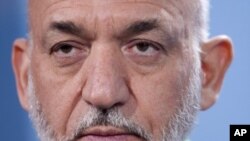A day after a suicide bomb tore through central Kabul and , Afghan President Hamid Karzai is blaming a Pakistan-based group for the attack. Another explosion Wednesday killed at least 19 more Afghan civilians.
Wednesday's bombing took place in the southern Afghan province of Helmand - a known Taliban stronghold - raising the two-day death toll from terrorist bombings to at least 78. The Helmand explosion happened as Afghan families gathered elsewhere to mourn and bury loved ones killed the day before in two separate attacks.
In the wake of Tuesday's violence, Afghan President Hamid Karzai returned home from an international peace conference in Germany, canceling a planned trip to the United Kingdom. He visited Wednesday with dozens of hospitalized victims of the terrorist attack in Kabul.
President Karzai left no doubt that he believes there is a Pakistani connection to the violence.
Karzai says his government has launched an investigation, but that the attack in Kabul originated in Pakistan and that he plans to confront the Pakistani government about it.
In the worst of Tuesday's two attacks, at least 55 people - including one American - were killed in a suicide bombing in central Kabul, as Shi'ite Muslim pilgrims gathered at a shrine to mark Ashura, their highest annual holy day. The other attack, hours later in the northern Afghan city of Mazar-e-Sharif, killed four more people.
The Taliban has condemned the Kabul attack. A Pakistan-based group, Lashkar-e-Jhangvi, appears to have claimed responsibility for it.
Lashkar-e-Jhangvi is an al-Qaida affiliated group with a history of attacking Shi'ite Muslims. Independent Pakistani security analyst Hasan Askari Risvi says up until now, the group has not been thought of as transnational.
"The group was not known for operating outside of Pakistan," said Risvi. "They were operating in Pakistan, killing Shias in Pakistan. Therefore, if it is confirmed that it is that group then it is something, I would say, alarming, that this group is now operating inside Afghanistan."
Askari says the deliberate targeting of Shi'ite Muslims has undoubtedly drawn the attention of Afghanistan's neighbor, predominantly Shi'ite Iran.
"This incident is one incident - but if it becomes a kind of a feature, then of course Iran will be considering how to help the other group," he said. "And this can add a new dimension to the whole problem."
Pakistani authorities have been hunting members of Lashkar-e-Jhangvi, an outlawed Sunni extremist group, for years for their role in previous attacks. Islamabad has not publicly responded to President Karzai's statements Wednesday blaming the group.
Afghan President Vows to 'Confront Pakistan' Over Holy Day Terror Attack
- By Kurt Achin




